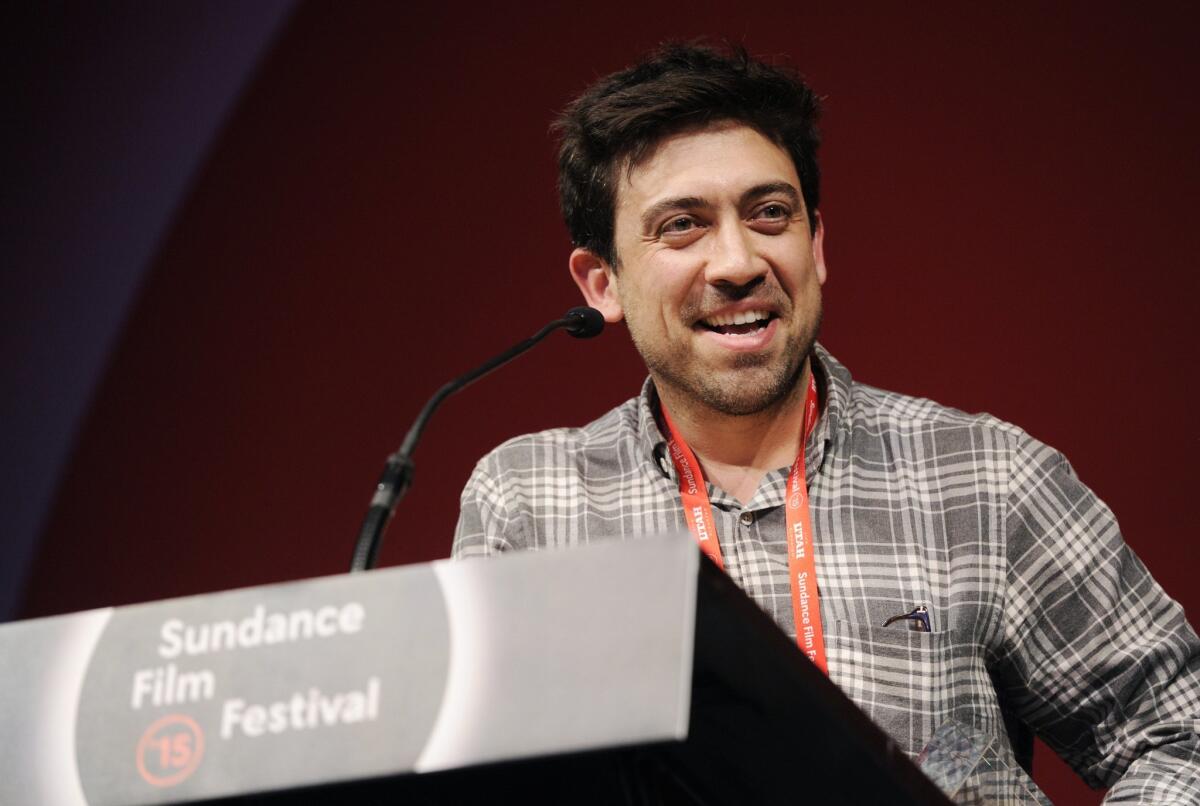Sundance 2015: ‘Me and Earl and the Dying Girl’ wins big at awards

- Share via
Reporting from Park City, Utah — “Me and Earl and the Dying Girl,” a dramedy about a high-school senior and his relationship with a leukemia-afflicted classmate, was the big winner at the Sundance Film Festival on Saturday night.
Alfonso Gomez-Rejon’s film, which uses animation and other flourishes in telling its coming-of-age story, took both audience and grand jury prizes in the U.S. dramatic category.
“This movie is about processing loss and celebrating a beautiful life and a beautiful man,” Gomez-Rejon said as he accepted the grand jury prize, alluding to his late father, Julio Cesar Gomez-Rejon, to whom the film is dedicated.
“This week has been incredibly cathartic for so many reasons,” he said earlier upon accepting the audience prize.
The offbeat imprisoned-children doc “The Wolfpack” landed grand jury U.S. documentary honors. Crystal Moselle’s movie examines a group of brothers held captive by their father in a New York apartment as they turn to movies and movie re-enactments for redemption.
“I stopped these kids on the street one day and here I am,” Moselle said in accepting the prize, adding “Life is surreal.”
Robert Eggers took the directing prize for U.S. dramatic for “The Witch,” his supernatural story of evil spirits and exorcisms in Puritan-era colonial America.
A big win at Sundance can boost a film as it heads into the market and the following award season.
The prizes for “Earl” marks the third time in as many years that a film won the top audience and jury honors in the lead category of U.S. dramatic after “Whiplash” and “Fruitvale Station” pulled off the feat the past two years.
With its pop-cultural references and intimate look at a confused teenager, “Earl” was a huge crowd-pleaser when it premiered last weekend at the festival. Fox Searchlight snapped up rights to the movie for release later this year.
There were a number of surprises at the ceremony. The U.S. Dramatic jury did not hand out any acting prizes, a somewhat unusual move.
Rick Famuyiwa’s Inglewood dramedy “Dope,” an audience favorite and major acquisition, came away with just one prize, for editing.
And “The Diary of a Teenage Girl,” Marielle Heller’s look at a teenager discovering her sexuality in 1970s San Francisco-- considered a frontrunner for several awards, particularly for star Bel Powley--landed just one prize, to Brandon Trost for cinematography.
Radio and comic personality Tig Notaro hosted the awards, offering her droll, self-deprecating brand of humor. Notaro is also the subject of a film at the festival.
In other awards, Matthew Heineman won the U.S. documentary directing award for “Cartel Land,” his look at the deadly drug battles south of the border, and dedicated the prize to victims of the “senseless violence perpetuated by the drug wars in Mexico.”
The Waldo Salt award for screenwriting went to Tim Talbott for “The Stanford Prison Experiment,” a dramatization of the infamous 1971 behavioral scientific investigation.
The U.S. Documentary audience award went to “Meru,” Jimmy Chin and E. Chai Vasarhelyi’s look at elite American climbers who try to scale a near-impossible Northern Indian peak.
Sundance also carves out separate categories for global fare. In those realms, the world cinema grand jury award went to “The Russian Woodpecker,” Chad Gracia’s story of the Ukrainian revolution and artists exploring the connection between Chernobyl and a Cold War-era communications weapon.
“I don’t think we can stop Russia with bombs, but I think with a little bit of art and truth maybe we can make some progress,” Gracia said. One of his protagonists, Fedor Alexandrovich, took the podium and made an impassioned political plea.
“When the Kremlin attacked Chechnya nothing stopped them. When the Kremlin attacked Georgia nothing stopped them. Now Kremlin is attacking Ukraine,” he said. “Save Ukraine please. Tomorrow will be too late.”
Politics and social issues were on display often at the awards. After a “special impact” award was conferred on Marc Silver’s Jordan Davis movie “3 1/2 Minutes,” Davis’ mother, Lucia McBath, a heartbreaking character in the film, said: “I always wanted Jordan’s life to mean something, but I never imagined his life as well as his death would mean so much to so many people.” She added, “It would change the consciousness and prick the souls of our nation.”
She and Davis’ father, Ron, received a standing ovation after the latter spoke powerfully and wound up his remarks by chanting three times “Black Lives Matter.”
And David Felix Sutcliffe, co-director of counter-terrorism doc “(T)error,” noted that “Trusting the FBI is an incredibly dangerous thing to do at this time,” upon receiving a special jury prize for break out first feature.
Meanwhile, the world cinema grand jury prize went to “Slow West,” John Maclean’s story of a young man and his bodyguard (played by Kodi-Smit McPhee and Michael Fassbender) as they travel across the frontier during the era of the Civil War.
Audiences honors in world dramatic went to “Umrika,” Prashant Nair’s family drama of immigration and a poor North Indian village. The world cinema documentary audience award went to the U.K. film “Dark Horse,” directed by Louise Osmond.
The Next audience award went to Josh Mond’s “James White,” a drama that is the latest from the filmmaking trio of Mond, Sean Durkin and Antonio Campos, who have previously been to Sundance with “Martha Marcy May Marlene” and “Simon Killer.”
The festival wraps up Sunday after more than 125 features screened, dozens of deals consummated and various forms of socializing, professional and otherwise, taking place.
“What happens in Sundance,” said the filmmaker and juror Taika Waititi as he presented an awards, “ends up on Facebook.”
More to Read
Only good movies
Get the Indie Focus newsletter, Mark Olsen's weekly guide to the world of cinema.
You may occasionally receive promotional content from the Los Angeles Times.












